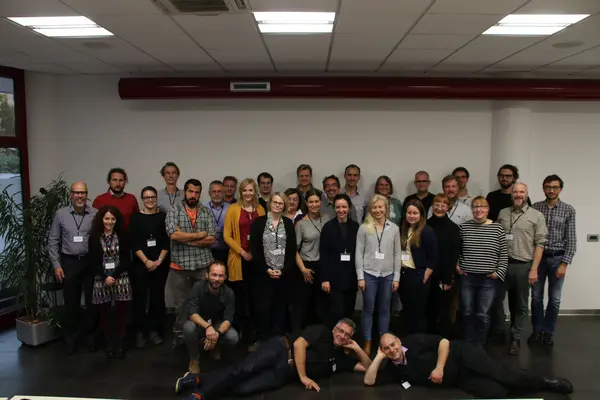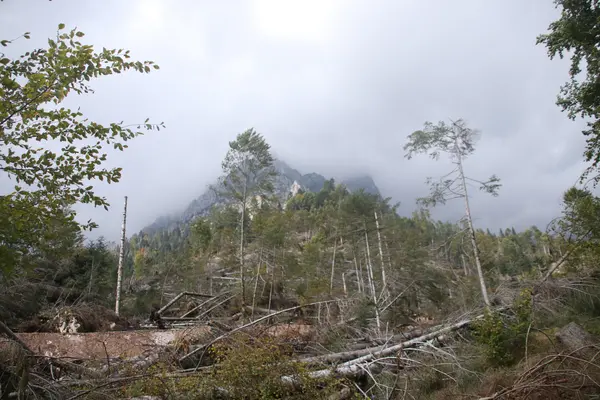The project entitled "Innovative policy and business models, decision bases and financial incentive mechanisms for the sustainable provision of forest ecosystem services" (InnoForESt) was funded under the European Union's Horizon 2020 Framework Programme for Research and Innovation. The budget totalled 4.019 million euros. The project ran from November 2017 to December 2020, with HNEE responsible for project coordination and working closely with the Leibniz Centre for Agricultural Landscape Research in Müncheberg.

The InnoForESt team, Trento, Italy - Representatives of all 16 partners in October 2018.

Fiera di Primiero, Italy - Effects of the storm ‘Vaia’ in Italy from 26 to 30 October 2018. 28 people lost their lives and many forest owners lost large areas of forest.

Project logo
Detailed project description
The overarching aim was to investigate different ways of providing forest ecosystem services and to contribute to the development of innovative solutions in the areas of policy, management and business. In addition, the potential for innovation transfer to other regions or countries across Europe was to be explored and influencing factors and framework conditions for a reliable establishment of the innovations were to be identified.
In order to achieve these goals, innovative policy and business models were compiled and their success factors classified. Promising governance approaches and framework conditions that support the dissemination of successful policy and business models were also to be identified in order to develop knowledge-based recommendations for action on this basis.
Ultimately, the results should contribute to better coordinated, efficient and sustainable governance and financing of forest ecosystem services in Europe. In concrete terms, this means incentivising forest owners and administrators to provide forest ecosystem services sustainably and to develop forest policy and management measures that improve the quality of life in society. Furthermore, the coordination of political measures was to be improved, thereby overcoming gaps in the interaction between science, policy and practice.
Project progress and results
Due to the coronavirus pandemic, many joint meetings of the project consortium, public events and the final conference, which was to take place in Brussels, have had to be cancelled or held online since February 2020. As a result of these circumstances, the project was extended by two months and many personal contacts did not take place. The personal exchange that is essential in a project like this, and above all for the further development of important innovative forest management approaches, was therefore lacking. However, shifting communication to the digital space also brought with it a certain degree of flexibility and cost reduction.
Storm Vaia in 2018 also disrupted one of the project's general assemblies in Trento, Italy, as well as the entire Trentino region, where one of the project's case studies is located. This severely impaired the development of the region and destroyed large parts of the forests, which the local forest administrations and forest owners are still struggling with today. "Here you could directly experience the effects of climate change and also the consequences this can have for forests and people. The project results and the innovative approaches from the participating European regions will also help us to be better prepared for such influences in the future," summarises Stefan Sorge, project team member and doctoral student at HNEE. He also summarises: "An important result that we have achieved in the InnoForESt project is that we can provide forest owners and political decision-makers with an information base on innovative approaches in forestry. Forest reorganisation, afforestation and forest management can thus be made more sustainable and adapted to climate change. We can also put other important ecosystem services on the agenda". This means that, in addition to wood as a raw material, aspects such as CO2 compensation, water storage and filtering or the forest as a recreational area for tourists can be taken into account in decisions and integrated, recognised and remunerated in economic and political activities.
Despite, or perhaps because of, the heterogeneity and internationality of the project consortium, solutions to very profound problems in European forests were jointly developed, which can now be promoted and disseminated in the form of innovative approaches in forestry and the sectors involved.
The project partners
The project brought together 16 partner organisations from nine EU countries. The consortium included forest and environmental administrations, wood processing and consulting companies, hunting associations, forestry companies, landowners and other non-governmental organisations (NGOs) as well as European universities and research institutes.
All partners are experienced in researching and developing novel policy and business models for forest ecosystem services. The close interaction between research and practice enabled promising examples of the provision of diverse forest ecosystem services to be analysed in order to learn from them and explore their opportunities and limitations.
The project consortium consisted of:
- Leibniz Centre for Agricultural Landscape Research (ZALF) e.V., ZALF, Germany
- Suomen ympäristökeskus, SYKE, Finland
- Università degli Studi di Trento, UNITN, Italy
- Centrum transdisciplinarnych studiicetio N.O., CETIP SK, Slovakia
- Forstliche Versuchs- und Forschungsanstalt Baden-Württemberg, FVA, Germany
- University of Twente, UT, Netherlands
- Lunds Universitet, ULUND, Sweden
- University of Innsbruck, UIBK, Austria
- European Landowners Organisation, ELO ASBL, Belgium
- Studienzentrum für internationale Analysen (STUDIA), Austria
- Suomen metsäkeskus - Finlands skogscentral, FFC, Finland
- Foundation Academy for Sustainable Development Mecklenburg-Vorpommern, ANE, Germany
- Provincia autonoma di Trento, PAT, Italy
- IREAS, Institut pro Strukturalni Politiku OPS, IREAS CZ, Czech Republic
- Universeum AB, Universeum, Sweden
- Eberswalde University for Sustainable Development, HNEE, Germany
Further information:
- Video explaining the project (English)
- Project page (English)
- Project results and further information material (English)
- Case study forest share in Mecklenburg-Western Pomerania
- Case study sustainable value chain in Austria
- X: @InnoForESt
- Further videos (English, German)
Note on image material
The photos available here may be used for reporting purposes.
Please note the copyright notice © Stefan Sorge
Please note the copyright notice © Projekt InnoForESt